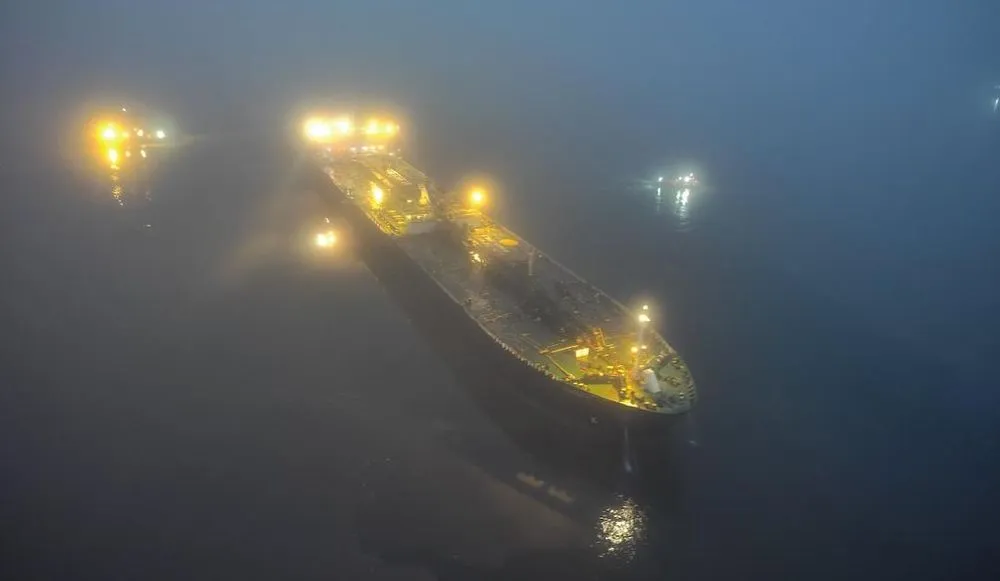Finland’s trial of men charged over Baltic Sea cable damage hits choppy waters
The trial in Finland of three senior officers of the Eagle S, a Russian-linked oil tanker that damaged multiple cables in the Baltic Sea last December, has been halted due to a court challenging Finland’s jurisdiction over the case.
On Thursday, the country’s deputy prosecutor general filed a notice of appeal against a decision by the Helsinki District Court, which ruled the men could not be charged in Finland for suspected crimes that took place outside of Finnish territorial waters.
The court’s decision threatens to scupper the prosecution of the captain of the Eagle S and two of his senior officers, who were charged earlier this year with aggravated criminal mischief and aggravated interference with communications.
Prosecutors said the oil tanker had dragged its anchor for almost 62 miles (100 km) due to the officers’ recklessness, resulting in the complete severing of multiple subsea cables, including the Estlink 2 power cable and four telecommunications cables. All three men denied the charges.
The Eagle S had departed from the Russian port of Ust-Luga on Christmas Day with a cargo of unleaded petrol and diesel from Russia as part of what Western countries describe as Russia’s “shadow fleet” — a collection of up to 1,000 decrepit vessels with opaque ownership structures that sail under flags of convenience to export sanctioned Russian goods.
Amid concerns about Russian sabotage, the oil tanker was subsequently boarded by armed police via helicopter. It was released in March — minus the three members of its crew who remained under investigation — with its cargo of unleaded petrol and diesel free to transit onwards to Port Said in Egypt, where it could be sold without sanctions.
In its judgment last week, the Helsinki District Court ruled that it wasn’t lawful to bring charges against the men under the Finnish Criminal Code due to restrictions under the U.N. Convention on the Law of the Sea. Following the deputy prosecutor general’s appeal, the case will now proceed to the Helsinki Court of Appeal.
According to the District Court, the proper jurisdiction for criminal incidents in international waters would lie either with the sailors' state of citizenship, in this case Georgia and India, or with the vessel's flag state, which for the Eagle S was the Cook Islands.
As reported by Maritime Executive, the ruling exposes Finland to having to pay the costs of the defendants’ legal fees, estimated to be around $200,000, as well as to civil action by the Eagle S’s owner, which is reportedly considering a multimillion-dollar civil suit over the ship’s seizure..
The trade publication warned that the judgment had provoked concern among the maritime legal community about the Convention on the Law of the Sea: “If the coastal state has no jurisdiction over subsea infrastructure outside of the 12-mile line, and a ship can flag with a highly permissive open registry, there is no legal means of prosecuting sabotage in international waters.”
Speaking to Finnish national broadcaster Yle, Henrik Ringbom, professor of maritime law at Åbo Akademi University, said: “On certain points it was found that the suspects could have been found guilty, but that international obligations put obstacles in the way and mean that Finland cannot pass judgment.
“As long as you have a flag state that doesn't care, you can now count on the freedom of navigation to continue to break cables without consequences,” said Ringbom. “This means that no one can do anything about it. This is completely unreasonable.”
It comes as a combination of the G7 nations and the Nordic-Baltic 8++ group established what they have called the Shadow Fleet Task Force, according to a statement from the Estonian ministry of foreign affairs.
The task force met this week to discuss how to “further disrupt and deter the global shadow fleet engaged in illegal, unsafe or environmentally perilous activities,” explained the statement, adding the collective was “deeply concerned by the rise of unsafe and illicit shipping practices by certain operators, with the willing collaboration or negligent oversight of certain state actors [...] to circumvent G7+ sanctions, and the use of stateless or falsely flagged vessels.”
It follows French military officials boarding another oil tanker last week, as reported by BBC News, and charging its captain with refusing to follow instructions. That ship, also described as part of Russia's shadow fleet, was suspected of being used to launch drones that forced the closure of airports in Denmark in September.
These incidents were among what European Commission President Ursula von der Leyen warned in a speech this week were acts of Russian hybrid warfare.
Alexander Martin
is the UK Editor for Recorded Future News. He was previously a technology reporter for Sky News and a fellow at the European Cyber Conflict Research Initiative, now Virtual Routes. He can be reached securely using Signal on: AlexanderMartin.79



